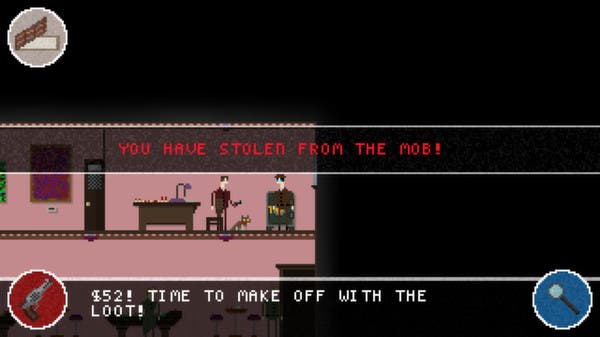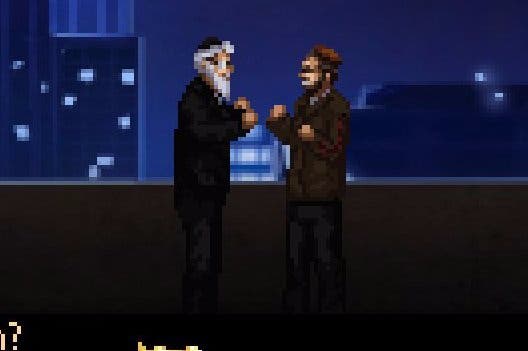Cara Ellison on: The search for noir
A little light gun music.
ITEM: In the Edinburgh Filmhouse in 2007 Tartan Noir writer Allan Guthrie tells me in a private conversation that contemporary noir is when "you start out f**ked and you end even more f**ked".
ITEM: Noir fiction and film journalist Woody Haut writes in his seminal book Neon Noir that "Contemporary noir fiction can be read as quasi-anthropological texts...descriptions of what America has become, or chapters in a survivalist's handbook. Despite a handful of writers preoccupied with the poetry of violence or the grand gestures of everyday life, the genre continues its drift towards simulation, extremism and confession."
ITEM: Does an obsession with the Cold War masculinity of noir fiction inform what games I play? In 2007 I wrote a dissertation on Max Payne and noir hypertextuality in level design before I ever became any kind of games shamus.
I embark on an investigation: are current games furthering the noir genre?
The last article was going to be the toughest, but I'm not shy and I never was.
I began with a Wadjet Eye detective adventure game called The Shivah. The Shivah was Dave Gilbert's first venture into games, it's slow, obscure and clunky in progress and navigation, like wading through treacle just to pick up a shopping list. But it shines in the writing, which is why adventure games were always the gentleperson's option. It's about the darkness and unforgiving fatalism of the main character, a Rabbi with a dwindling congregation. The noir is there in all the emails on his computer, his community is quitting his sermons. Rabbi Stone is so bleak in outlook they can't take it any more.

Stone's the sort of Rabbi that ultimately may confront a knife-wielding thug in a deserted Lower East Side subway, disarm him with stern moralism, and offer to push him onto the tracks. Rabbi Stone gets into a Monkey Islandesque punch-up with another Rabbi, and through most of the game you are given the conversational options 'Polite response; Brush off response; Rabbinical response'. Though the despairing message is ultimately that even religious leaders that you rely on may be corrupt or acquainted with moral ambiguity, it has the wink of Raymond Chandler, that feeling of 'we're all f**ked but we may as well get on with our duty' that harks back to noir's more optimistic, less complicated forefather, hardboiled fiction. It's this almost spiritual quality in the game that was missed by vox pops in the Israeli press at the time, who were rather disparaging about Rabbis being involved in any sort of fisticuffs at all.
Though The Shivah is fatalistic in dialogue it is also so in the choices it gives you. It is extreme in a blunt, game-over-you-were-shot-dead-for-making-a-minor-mistake way. Though there's a lot in the investigation or mystery (exploration if you will) part of the game, there is very little in the way of choice, rather than the unexpected mistaken choice that leads you to sudden death. The Shivah could be read as a confession of the cynicism present in New York Jewishness considering Dave Gilbert is Jewish, though it could also be an over-familiarity with noir tropes themselves. But it's not the game that ultimately sates my appetite, it's only really noir in narrative tone.
Other games play with the idea of the neverending crime nightmare of noir as an ongoing state of urban life. The little indie game Noir Syndrome, for example, takes the noir notion that the completion of a detective's remit never improves their environment in any way, and generates procedural narrative. Each time Noir Syndrome is begun it randomly assigns clues, characters and a murderer to randomly-generated locations and then gives the player a certain amount of moves to hunt the murderer down. It's a clever idea (though not much moved on from Carmen Sandiego) that unfortunately doesn't generate much of a story, and so isn't much fun, but it's the sort of experimental thing that could produce something great if it was iterated on with more attention to pacing and writing. At its heart, most contemporary noir has left hardboiled's 'apprehend the murderer' behind for more political enquiry: what if the murderer is just a victim of profane environment?

Much of my time is spent considering games that have thematic hardboiled hat-tips such as Max Payne, The Wolf Among Us and LA Noire, but their writing is conservative linear pastiche; they could further comment on the genre via structure instead of aping only narrative tropes. There's little extreme or confessional about them, even if you consider LA Noire's sterile 'interrogation' scenes. Max Payne's Valkyr hallucinations are the closest we get to a harrowing discomfort, his bloodied painkiller-stuffed grimace indicating something is wrong, but bullettime feels powerful. Power should not belong to Max.
A noir hero is the embodiment of powerlessness. They are the little hope. A noir hero opens the door to a man with a knife and offers him whisky as they are stabbed. The point is that you expected to have to deal with the knife sooner or later. Discomfort is the only real thing in a noir universe. Endurance is a noir hero's only important virtue.
I start to consider games that take the noir penchant for wordless, unstylish, unforgiving beatings like the sort James Lee Burke's Dave Robicheaux would take, a narrative spiralling into destructive political situations, a claustrophobic environment that seems to mutate into a worse state of itself at each turn. An environment that requires a hero to repeatedly Get. Up. Like the krav maga-trained V.I. Warshawski realising, with contempt, that she has woken in a hospital gurney again and f**k that.
Teleglitch is that game. It is a roguelike top-down shooter that uses zoomed-in corridors like veins to funnel you into the next awful confrontation with the mutated crimes of corporations. Each System Shock-like terminal informs the player of the increasing state of emergency and the disaster of mistakes that have been made in the name of the military-industrial complex.

Like Jim Rossignol mentions, Teleglitch's Quake-like corridors have a menacing relationship with light and dark; it simulates contemporary noir fiction's film roots. The grating sounds coming from each muculent chamber make a disturbing hum. It's a cynical and parochial environment: it's the roguelike elements, the procedurality, the reorganisation of the space station environment each time you die that brittle claustrophobic, choking death, back-against-the-wall. It's the terminals' hard text narrative of human overreach, of coldness violating empathy, the way the game remixes itself to keep you constantly in fear of stalking that violent path. Though Bloodborne was considered, it's Teleglitch that wins.
Teleglitch closes doors behind you. It requires that you scrape together fragments to make weapons as you go, using anything around you to survive. The trail of wicked human confession, the constant unending dead ends of the randomisation of map layouts, and the relentless brutality of mutants hurtling towards the player serve to make a playful humanmade hell. Sometimes I feel like I am in LA Confidential's chaotic streets there. Sometimes I feel like modern noir is just a roguelike with excessive shadows and the close echoes of people laughing down corridors. To gun music.
Noir is the most immediate, personal hell, and a game that is noir should breathe down your neck. As Easy Rawlins said, "Real was what you could feel. History was like TV for me, it wasn't the great wave of mankind moving through an ocean of minutes and hours. It wasn't mankind getting better either." At least as long as noir continues to reinvent itself through different media, you can continue to believe that the best thing is to do like Warshawski and get back out of the gurney, pick up that gun.
This will be my last column as I go on to take a small break to work in game design! Thank you to all the readers of my column, and in particular to Chris Donlan, my editor, whose enthusiasm and expert edits have been invaluable.

